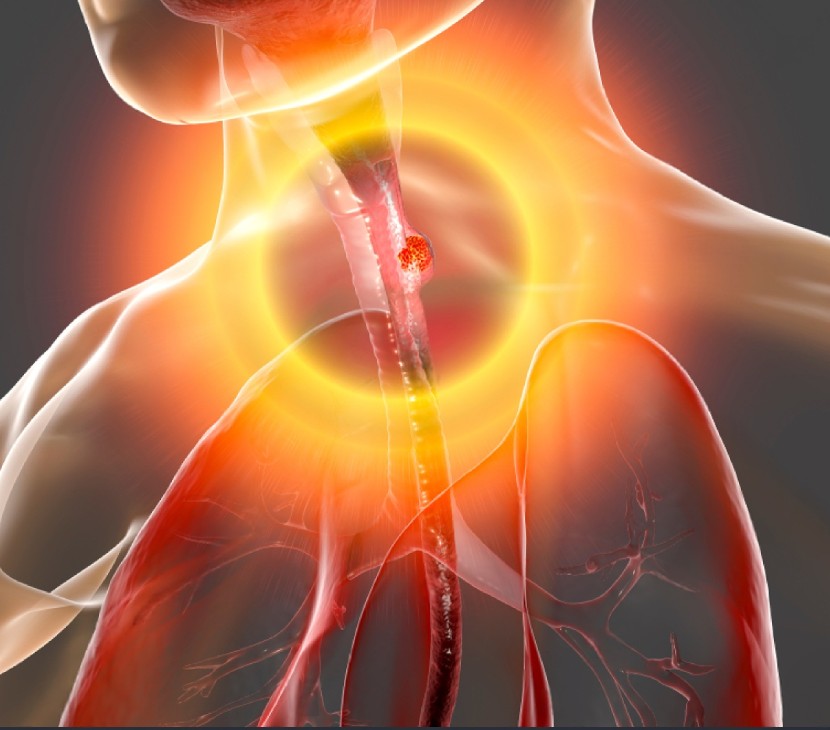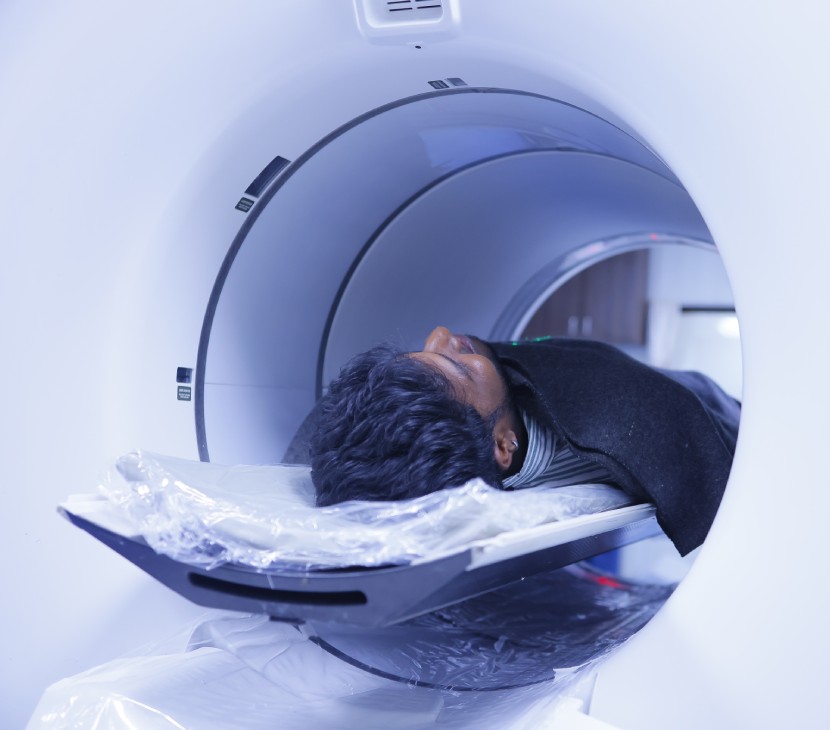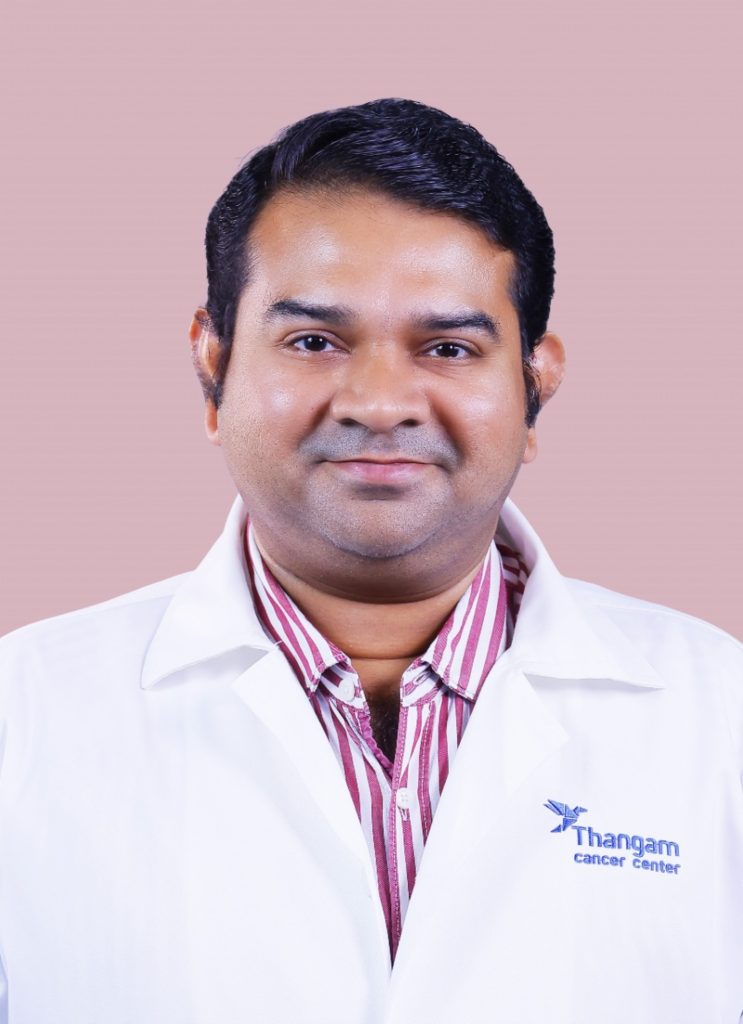Esophageal cancer
Esophageal cancer care at Thangam cancer center
Esophageal cancer is a serious condition in which malignant cells form in the tissues of the esophagus—the muscular tube that carries food from the throat to the stomach. While often diagnosed at an advanced stage, early detection and expert treatment can significantly improve outcomes.
At Thangam Cancer Center, our specialized esophageal cancer team uses state-of-the-art diagnostics and the latest in surgical and non-surgical therapies to offer comprehensive, evidence-based care.


What Is Esophageal Cancer?
The esophagus is a hollow, muscular organ behind the windpipe and in front of the spine. Esophageal cancer develops when abnormal cells grow uncontrollably in its lining. These cells may form tumors that can interfere with swallowing and eventually spread to other parts of the body. There are two main types of esophageal cancer:
Adenocarcinoma
Usually affects the lower esophagus and is linked to Barrett’s esophagus and acid reflux (GERD).
Squamous Cell Carcinoma
Typically found in the upper or middle parts of the esophagus, often linked to smoking and alcohol use.
A third, rarer type is Small Cell Carcinoma, arising from hormone-secreting neuroendocrine cells.
Causes and Risk Factors
Several factors increase the risk of developing esophageal cancer:
- Smoking and Tobacco Use
- Heavy Alcohol Consumption
- Gastroesophageal Reflux Disease (GERD)
- Barrett’s Esophagus – a precancerous condition linked to chronic acid reflux
- Obesity
- Poor Diet – low in fruits and vegetables, high in processed meat
- Hot Beverages – long-term consumption of very hot liquids
- Chemical Injuries – such as swallowing caustic substances
- Genetic Syndromes – including Plummer-Vinson syndrome
While not all risk factors are avoidable, early intervention and lifestyle modifications can reduce your risk significantly.

Symptoms of Esophageal Cancer
Esophageal cancer may not cause symptoms in its early stages. When symptoms do appear, they may include:
Difficulty or pain while swallowing (dysphagia)
Persistent heartburn or indigestion
Chest pain or pressure
Frequent choking on food
Hoarseness or chronic cough
Unexplained weight loss
Vomiting or regurgitation of food
Pain behind the breastbone or throat

Diagnosis and Screening
At Thangam Cancer Center, we use a comprehensive range of tests to confirm and stage esophageal cancer:
MRI
Especially for complex cases
Bronchoscopy
If there’s concern about airway involvement
Laparoscopy and Thoracoscopy
Minimally invasive methods for staging and biopsy
Once diagnosed, the stage of the cancer is determined, which is crucial for planning treatment. Staging assesses whether the cancer is localized, regionally advanced, or metastatic.
Endoscopy
To view the esophagus and obtain biopsy samples
Endoscopic Ultrasound (EUS)
For tumor depth and lymph node involvement
CT Scan
To identify local and distant spread
PET-CT Scan
For detailed cancer staging
Prevention and Lifestyle Tips
You can reduce your risk of esophageal cancer by:
- Quitting tobacco in all forms
- Limiting alcohol intake
- Avoiding very hot beverages
- Maintaining a healthy weight
- Eating a diet rich in fruits and vegetables
- Managing GERD and treating chronic acid reflux
- Seeking early evaluation for persistent heartburn or swallowing difficulties

Treatment Options for Esophageal Cancer
Treatment depends on the type, stage, location of the tumor, and overall health of the patient. Our multidisciplinary tumor board ensures personalized treatment planning for every patient.
Surgical resection remains the cornerstone of treatment for early and localized esophageal cancer. Common procedures include:
- Esophagectomy: partial or complete removal of the esophagus
- Minimally Invasive Surgery: laparoscopic or robotic-assisted surgery for quicker recovery
Combined chemotherapy and radiation therapy is often used before surgery (neoadjuvant) or in patients who are not surgical candidates. This approach helps shrink tumors, improve operability, and manage symptoms.
- High-energy X-rays are used to destroy cancer cells.
- May be delivered externally or internally (brachytherapy)
- Sometimes used with stent placement to keep the esophagus open.
- Uses anti-cancer drugs to kill cancer cells throughout the body.
- Typically used in combination with other modalities for more effective results.
- Focuses on specific molecules in cancer cells, such as HER2.
- Can be less harmful to normal cells than traditional chemotherapy.
A promising option for certain advanced cases, especially those with PD-L1 positive tumors.
- Laser Therapy: destroys tumors using high-intensity light
- Electrocoagulation: uses electric current to kill cancer cells
- Endoscopic Stent Placement: to relieve dysphagia and maintain nutritional intake




